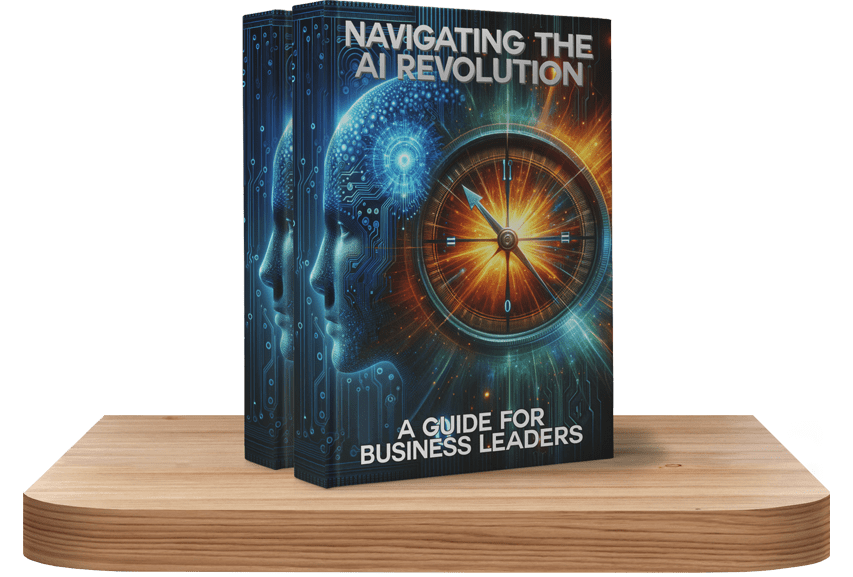In today’s fast-evolving digital landscape, artificial intelligence (AI) is no longer just a futuristic concept—it’s a powerful tool driving significant change across industries. Businesses around the globe are leveraging AI to streamline operations, enhance customer engagement, and unlock unprecedented growth opportunities. In fact, recent research by McKinsey estimates that generative AI could add a staggering $2.6 trillion to $4.4 trillion annually to the global economy, with the potential to impact up to 20% of the U.S. GDP.
The question is: Can your business afford to miss out on this transformation?
From AI-driven chatbots handling 65% of customer interactions to intelligent systems that automate project management tasks, AI solutions are rapidly becoming essential for companies that want to remain competitive. This article will explore the key ways businesses are using AI to revolutionize their operations, boost efficiency, and prepare for a future powered by artificial intelligence.
Section 1: The Rise of AI-Driven Chatbots
As a leading provider of Artificial Intelligence solutions for business, we’ve seen firsthand how AI-driven chatbots have transformed customer engagement. In today’s market, businesses can no longer rely solely on traditional methods of communication. AI-powered chatbots are stepping in to provide the fast, efficient, and personalized service that modern customers demand.
Artificial intelligence solutions for business have revolutionized customer interactions by enabling chatbots to handle 65% of customer inquiries. This shift is not just about automation; it’s about enhancing the customer experience. According to recent studies, 67% of consumers already rely on chatbots for quick resolutions, and an impressive 86% of those users report positive experiences. This high level of customer satisfaction demonstrates that chatbots are more than a trend—they are a vital component of any competitive business strategy.
At our company, we specialize in creating AI chatbots that are designed to seamlessly integrate into your existing systems. These intelligent assistants can manage everything from answering frequently asked questions to assisting customers with completing purchases. By doing so, they free up human resources for more complex tasks, improving both efficiency and the bottom line.
In sectors like retail and consumer services, chatbots powered by Artificial Intelligence solutions for business are becoming indispensable. Customers are increasingly turning to AI for instant responses and personalized service. This shift is reshaping customer expectations, and businesses that fail to adapt risk being left behind.
Furthermore, it’s important to consider the impact chatbots have on internal efficiency. By automating routine customer service tasks, businesses can reduce response times, improve accuracy, and enhance overall customer satisfaction. This ultimately leads to stronger customer relationships, higher retention rates, and increased revenue—all powered by AI.
In conclusion, the adoption of AI-driven chatbots is not just an upgrade—it’s a necessary transformation. Businesses that embrace these Artificial Intelligence solutions for business will position themselves as leaders in their industries, ensuring long-term growth and success.
Section 2: Transforming Customer Engagement and Business Efficiency
When it comes to Artificial Intelligence solutions for business, one of the most transformative impacts is the way AI enhances both customer engagement and internal efficiency. As businesses grapple with increasing customer demands and the need for streamlined operations, AI provides the key to handling both with precision and scalability.
At our software development company, we specialize in building custom AI tools that help businesses automate interactions across multiple channels. Whether it’s through SMS, email, or chatbots, AI-powered solutions ensure that your customers receive timely, accurate, and personalized responses. Research shows that 75% to 78% of customers prefer engaging with businesses via SMS rather than phone calls, a trend that AI can optimize by automating responses, reminders, and even appointment confirmations.
These Artificial Intelligence solutions for business aren’t just about responding to customers—they actively improve business processes by automating repetitive tasks. Imagine a chatbot that not only answers common customer queries but also follows up with personalized product recommendations based on customer behavior. In sales, these AI-driven tools can guide customers through purchasing decisions, upsell relevant products, and help close transactions faster. This not only boosts revenue but also increases customer satisfaction and loyalty.
Moreover, businesses that invest in Artificial Intelligence solutions for business can significantly reduce operational costs. For example, automated email campaigns can handle customer inquiries and follow-ups without human intervention. AI-driven customer service agents provide 24/7 support, allowing businesses to respond to customers at any time of day. This results in shorter wait times, fewer errors, and a consistently high level of service—all while saving time and resources.
The power of AI lies in its ability to enhance both sides of the equation: improving customer satisfaction while simultaneously driving operational efficiency. By automating key processes, businesses can focus on strategic growth initiatives rather than getting bogged down by routine tasks.
As we look to the future, it’s clear that Artificial Intelligence solutions for business will continue to play a critical role in reshaping the way companies operate. Whether it’s through AI chatbots, automated emails, or AI-powered SMS interactions, businesses that embrace AI will enjoy significant improvements in customer engagement and efficiency.
Section 3: AI’s Impact on Project Management and Operations
In addition to revolutionizing customer engagement, Artificial Intelligence solutions for business are transforming the way companies manage projects and streamline operations. As AI continues to evolve, its influence on internal business processes is becoming more profound, particularly in areas like project management and day-to-day operations.
One of the most significant predictions comes from Gartner, which estimates that by 2030, 80% of project management tasks will be fully automated by AI. This dramatic shift underscores the potential of AI to eliminate time-consuming administrative tasks, allowing businesses to focus on more strategic initiatives. Whether it’s tracking project milestones, assigning tasks, or managing deadlines, AI can automate these activities with precision and efficiency.
At our company, we specialize in developing AI tools that directly address these challenges. Our Artificial Intelligence solutions for business automate tasks such as scheduling, resource allocation, and even risk management, ensuring that projects run smoothly and on time. By using AI to monitor progress and identify potential bottlenecks, businesses can take a proactive approach to project management, minimizing delays and optimizing resource use.
Beyond project management, AI plays a vital role in improving operational efficiency across all departments. From automating invoicing and inventory management to optimizing supply chain logistics, AI’s ability to process large amounts of data in real time helps businesses make better, faster decisions. This not only reduces errors but also increases productivity and profitability.
AI also enhances decision-making processes by analyzing historical data to predict future outcomes. For example, AI tools can analyze past projects to identify trends in performance, helping managers make data-driven decisions on staffing, budgets, and timelines. This predictive capability allows businesses to mitigate risks before they become issues, ultimately improving project outcomes.
Investing in Artificial Intelligence solutions for business goes beyond simply upgrading existing systems—it’s about fundamentally transforming how companies operate. By automating routine tasks, AI frees up valuable time and resources, allowing teams to focus on innovation, creativity, and long-term growth strategies.
As AI continues to advance, its role in project management and operations will only grow. Businesses that integrate AI now will not only improve their current processes but also position themselves for future success in an increasingly automated world.
Section 4: The Long-Term Benefits of AI Adoption
The adoption of Artificial Intelligence solutions for business is not just a short-term strategy for improving operations—it is a long-term investment in the future of business growth and innovation. As more companies embrace AI technologies, the competitive landscape is rapidly evolving. Businesses that fail to integrate AI into their operations risk being left behind as AI-driven companies lead the way in efficiency, customer engagement, and market adaptability.
One of the most compelling long-term benefits of AI adoption is its ability to continuously optimize business processes. AI systems are designed to learn and improve over time, becoming more efficient and effective as they process more data. This means that the initial investment in AI continues to pay dividends as the technology evolves. From predictive analytics that refine marketing strategies to automated systems that handle customer interactions, AI tools enable businesses to operate at a level of efficiency that would be impossible with manual processes.
Additionally, AI adoption opens up new revenue streams. AI-driven tools such as chatbots and virtual assistants are proven to enhance the customer experience, leading to increased customer loyalty and higher conversion rates. With AI, businesses can offer personalized recommendations, guide customers through their purchasing decisions, and provide 24/7 support, all of which translate into more sales and greater customer satisfaction. In fact, many consumers trust virtual assistants more than human salespeople when making purchasing decisions, a trend that is reshaping how businesses approach sales.
The flexibility and scalability of Artificial Intelligence solutions for business also ensure that companies can adapt to future challenges and opportunities. As markets evolve and customer expectations shift, AI-powered systems can quickly adjust, offering tailored solutions that fit the needs of the moment. Whether it’s responding to customer inquiries, managing inventory, or forecasting demand, AI provides the agility that businesses need to thrive in a rapidly changing environment.
Perhaps most importantly, AI adoption positions businesses for sustainable growth. By automating routine tasks, AI frees up human talent to focus on strategic initiatives and creative problem-solving. This not only enhances employee satisfaction but also drives innovation, allowing businesses to explore new products, services, and markets without being constrained by operational inefficiencies.
In conclusion, the long-term benefits of Artificial Intelligence solutions for business are clear: increased efficiency, enhanced customer satisfaction, new revenue opportunities, and the ability to scale and adapt to future challenges. As AI continues to shape the business landscape, companies that embrace this technology today will be the ones leading the charge into the future of industry.
Conclusion
The rise of Artificial Intelligence solutions for business is reshaping industries, unlocking new opportunities, and driving unprecedented efficiency. From AI-driven chatbots that enhance customer interactions to advanced systems that automate project management and streamline operations, AI is no longer a luxury—it’s a necessity for businesses that want to stay competitive. By adopting AI, companies can boost productivity, increase customer satisfaction, and position themselves for sustainable, long-term growth. The future belongs to those who harness the power of AI today. Will your business be ready?





